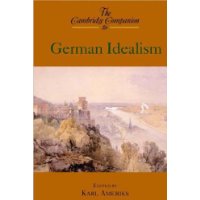| 商家名称 |
信用等级 |
购买信息 |
订购本书 |
|
|
 |
The Cambridge Companion to German Idealism |
 |
|
 |
The Cambridge Companion to German Idealism |
 |

基本信息·出版社:Cambridge University Press
·页码:322 页
·出版日期:2000年10月
·ISBN:0521656958
·条形码:9780521656955
·装帧:平装
·丛书名:Cambridge Companions to Philosophy
·外文书名:剑桥哲学指南: 德国的理想主义
内容简介 The Cambridge Companion to German Idealism offers a comprehensive, penetrating, and informative guide to what is regarded as the classical period of German philosophy. The essays in the volume trace and explore the unifying themes of German Idealism, and discuss their relationship to Romanticism, the Enlightenment, and the culture of seventeenth- and eighteenth-century Europe. The result is an illuminating overview of a rich and complex philosophical movement, and will appeal to a wide range of readers in philosophy, German studies, theology, literature, and the history of ideas.
编辑推荐 Review "The Cambridge Companion is an excellent supplement to those on Kant, Hegel, and Fichte." Choice
"This is essential reading for students and scholars of the most productive period in continental philosophy... the majority offer in-depth, jargon-free, authoritative treatments of central issues." Allegra De Laurentis, Philosophical Inquiry
"...this collection is a must-have for anyone interested in this period; it will certainly serve as a wise and illuminating companion for those coming to grips with the daunting texts of that time." Book Notes
"The contributions to this volume offer a rich, detailed, and in some respects innovative and remarkable account of that uniquely fecund and philosophically revolutionary epoch known as German Idealism." The Philosophical Review
"The Cambridge Companion is an excellent supplement to those on Kant, Hegel, and Fichte." Choice
Product Description The Cambridge Companion to German Idealism offers a comprehensive, penetrating, and informative guide to what is regarded as the classical period of German philosophy. The essays in the volume trace and explore the unifying themes of German Idealism, and discuss their relationship to Romanticism, the Enlightenment, and the culture of seventeenth- and eighteenth-century Europe. The result is an illuminating overview of a rich and complex philosophical movement that will appeal to a wide range of readers in philosophy, German studies, theology, literature, and the history of ideas.




